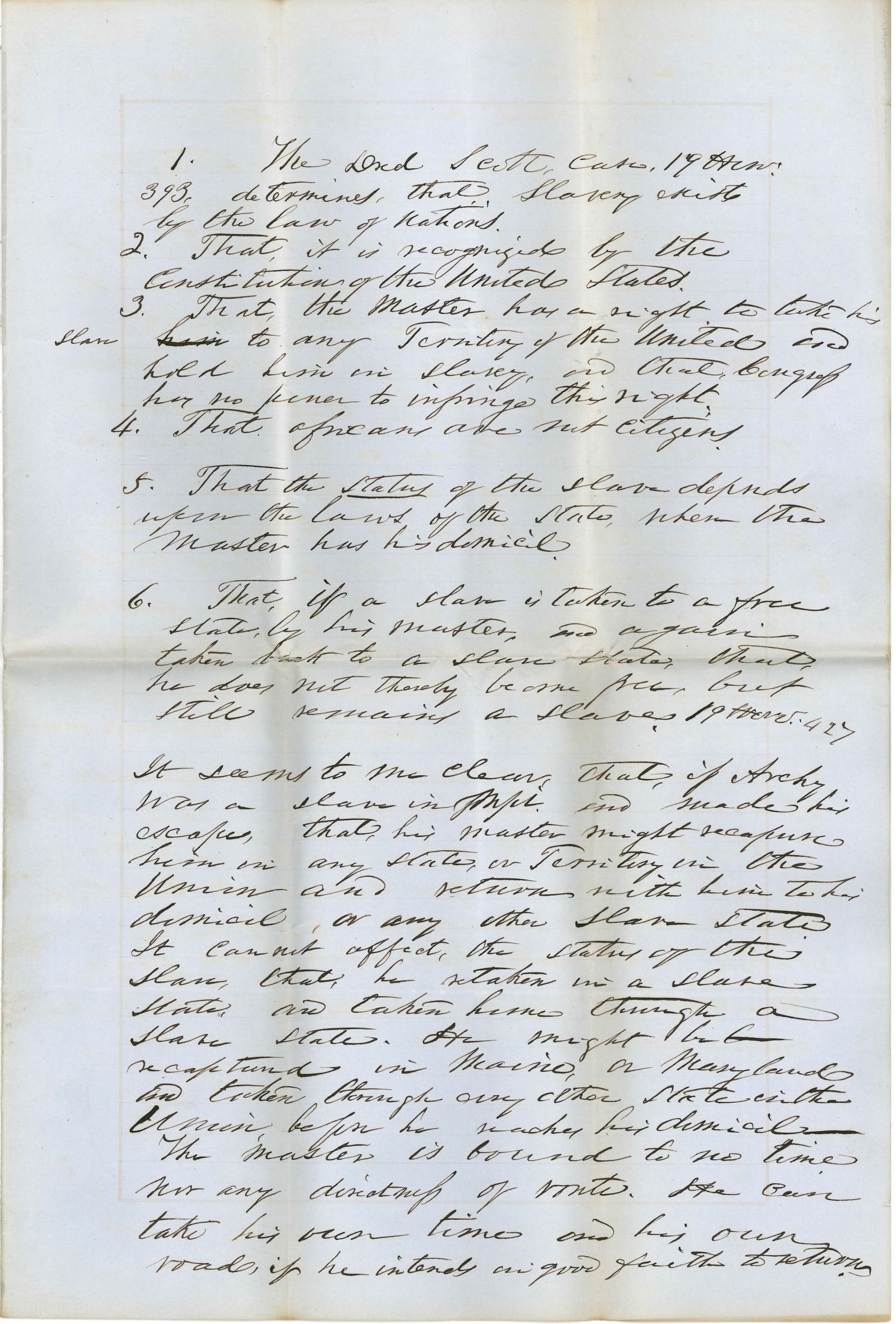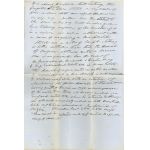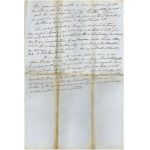Commissioner's Notes About the Fugitive Slave Act in Stovall v. Archy
ca. 4/1858
Add to Favorites:
Add all page(s) of this document to activity:

Add only page 1 to activity:
Add only page 2 to activity:
Add only page 3 to activity:
Add only page 4 to activity:
These unsigned, undated notes, are believed to be those of the U.S. Commissioner about the application of the Fugitive Slave Act in the case Stovall v. Archy, a Slave. They reference the Dred Scott decision.
[C. A.] Stovall v. Archy [Lee], a Slave is the only known Federal fugitive slave case tried in California, a "free state." Surviving documents in the case file were mostly filed by Stovall (the enslaver). These give Stovall's account of his and Archy's travels from Mississippi to California, where Stovall hired Archy out as a laborer. With the aid of some free blacks, Archy attempted to hide from Stovall to avoid being sent back to Mississippi, leading to his arrest as a fugitive. Charles Parker, an active member of the large free black community in Sacramento, filed a petition for writ of habeas corpus. The case was first tried at the Sacramento County Court in 1858. Because of the length of Stovall's residence in California, the county ruled that the Fugitive Slave Law of 1850 did not apply and that Archy was free.
Archy was re-arrested, however, and the case moved to the California Supreme Court. That court ruled that the Fugitive Slave Law did apply when enslavers were only temporary sojourners in the state (as Stovall claimed to be). Furthermore, though Stovall had lost his slaveowner status by hiring Archy out as a laborer, this would not apply, in this first instance, to Archy, who was then returned to Stovall.
Stovall then attempted to send Archy back to Mississippi by sea, but this attempt was checked by free blacks who took out writs charging kidnapping, which were served by San Francisco police. The case moved rapidly from San Francisco County Court to the San Francisco jurisdiction of the U.S. Commissioner, a southerner Stovall expected would find for the enslaver. However, the Commissioner concluded on April 14, 1858, that Archy was not a fugitive slave and should be released. The court filings suggest a version of events very different from Stovall's initial claim that he was a temporary sojourner in California.
[C. A.] Stovall v. Archy [Lee], a Slave is the only known Federal fugitive slave case tried in California, a "free state." Surviving documents in the case file were mostly filed by Stovall (the enslaver). These give Stovall's account of his and Archy's travels from Mississippi to California, where Stovall hired Archy out as a laborer. With the aid of some free blacks, Archy attempted to hide from Stovall to avoid being sent back to Mississippi, leading to his arrest as a fugitive. Charles Parker, an active member of the large free black community in Sacramento, filed a petition for writ of habeas corpus. The case was first tried at the Sacramento County Court in 1858. Because of the length of Stovall's residence in California, the county ruled that the Fugitive Slave Law of 1850 did not apply and that Archy was free.
Archy was re-arrested, however, and the case moved to the California Supreme Court. That court ruled that the Fugitive Slave Law did apply when enslavers were only temporary sojourners in the state (as Stovall claimed to be). Furthermore, though Stovall had lost his slaveowner status by hiring Archy out as a laborer, this would not apply, in this first instance, to Archy, who was then returned to Stovall.
Stovall then attempted to send Archy back to Mississippi by sea, but this attempt was checked by free blacks who took out writs charging kidnapping, which were served by San Francisco police. The case moved rapidly from San Francisco County Court to the San Francisco jurisdiction of the U.S. Commissioner, a southerner Stovall expected would find for the enslaver. However, the Commissioner concluded on April 14, 1858, that Archy was not a fugitive slave and should be released. The court filings suggest a version of events very different from Stovall's initial claim that he was a temporary sojourner in California.
Transcript
[page 1]- The Dred Scott Case 19 How. 393 determines, that, slavery exists by the law of nations.
- That, it is recognized by the Constitution of the United States.
- That, the Master has a right to take his slave to any Territory of the United and hold him in slavery, and that, Congress has no power to infringe this right.
- That, Africans are not citizens.
- That the status of the slave depends upon the laws of the state, where the master has his domicil.
- That, if a slave is taken to a free state, by his master, and again take back to a slave state, that, he does not thereby become free, but still remains a slave. 19 How. 427.
It seems to me clear, that, if Archy was a slave in Miss. and made his escape, that, his master might recapture him in any state, or Territory in the Union and return with him to his domicil, or any other slave state. It cannot affect, the status of the slave, that, he retaken in a slave state, and taken home through a slave state. He might be recaptured in Maine, or Maryland and taken through any other State in the Union, before he reaches his domicil. The master is bound to no time nor any directness of route. He can take his own time and his own roads, if he intends in good faith to return.
[page 2]
It is absurd to suppose, that, taking the fugitive through a slave state, or any number of free or slave states can affect the question in any way. Neither can the status of the slave on his way back, be changed by a temporary sojourn of the master, if it be a sojourn and not a settlement with a aim of acquiring a new domicil.
Stoval was a native of Miss. Nothing is better settled than that, the Domicil of origin obtains until a new one is acquired. In the case of De Bonneval vs De Bonneval 1 Curtis, being C. Eng: Ecclesiastical Reports, 498. in part held: “the domicil of origin continues until another is acquired, and a new domicil is not acquired by residence unless it be with an intention of abandoning the former domicil. A French man having quitted France in 1792 in consequence of the revolution there, and having resided in England until 1814, when he returned to France and afterwards occasionally resided in both countries –Held, not to have abandoned his domicil of origin.” Chancellor Kent : 2 Com: p. 431. says: “there must be intention and act united to effect a change of domicil.”
[page 3]
The residence of Stoval in California for the recovry of health, or temporary employment to raise means to enable him to return with his slave would not affect the status of the slave, or the right of the master, any more that a forcible detention of the master by a public enemy. The only question is did he have the animo revertendi?
If the master was returning through California, and the slave escaped it cannot admit of doubt, that, he would be a fugitive from labor under the act of the Legislature of 1850, Calif Law p. 231; as well as under the Act of Congress. The laws of California do not limit the master to any [underline] time [end underline] for the removal of the slave out of the state. Neither does the Act of Congress limit the time within which the slave may be arrested, or returned or the manner of his return, provided he was a fugitive from labor Stats. at Large Vol 9. P. 462
Again, a slave brought into the State by a mere sojourner from a [illegible letters] Slave State does not become free by such temporary sojourn. That is res judicata in this case by virtue of the judgment of the Supreme Court of the State of California. The reasoning of the court is immaterial, the judgment was, in substance, that, Archy was a slave, and, that, his master has a right to take him out of the state, that judgment is conclusive upon all other tribunals. It can not be changed by any other court, or officer, upon another writ of habeas corpus underline] upon the same state of facts and case Mercier vs. The People 25. Wendl. p. 63. 99.
It is not in the power of a state to pass laws, which would render void the effect of such a judgment, Jack vs Mary Martin 12 Wendell p. 311
[page 4]
On general principle, a mere sojourn of the master with his slave in a free state cannot work the emancipation of the latter. There must be some statute declaring that result—Butler vs DelaPline 7 Serg. Vs Rawle 378
“The Act of Assembly of Maryland, prohibiting the importation of slaves into that State for sale or to reside, does not extend to a temporary residence nor to an importation by such a person who hires the slave for a limited period, not being the Master or owner of such slave” Henry vs Ball 1 Wheaton p 1. 3 Pet. & Cond. 462
It is frequently said, that, as soon as a slave touches the shore of Brittain he is free. But Holroyd J. on commenting on this principle says: “he ceases to be a slave in England, only because there is no law, which sanctions his detention in slavery”. But under the Constitution of the United States, this can not be said of any State, or Territory, because by virtue of the federal compact slavery may be recovered under certain circumstances.
This primary source comes from the Records of District Courts of the United States.
National Archives Identifier: 295968
Full Citation: Unsigned, undated notes, believed to be those of US Commissioner on application of Fugitive Slave Act in the case; ca. 4/1858; Stovall v. Archy, a Slave; Case Files of the U.S. Commissioner, ca. 1855 - 1912; Records of District Courts of the United States, Record Group 21; National Archives at San Francisco, San Bruno, CA. [Online Version, https://docsteach.org/documents/document/notes-stovall-v-archy, April 24, 2024]Rights: Public Domain, Free of Known Copyright Restrictions. Learn more on our privacy and legal page.







